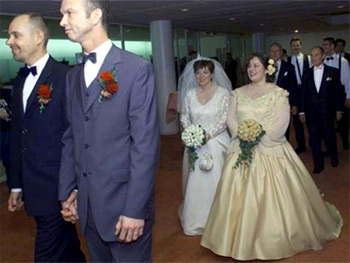
The Netherlands celebrated the 10th anniversary of the world's
first legally binding gay marriage on April 1, 2011.
Helene Faasen and Anne-Marie Thus who became the world’s first
legally wed lesbian couple told AFP: “We married for love, not
politics. But of course we were aware it was an historic moment.”
Boris O. Dittrich is advocacy director of the Lesbian, Gay, Bisexual and Transgender Rights Program at Human Rights Watch. He was the first openly gay member of parliament in the Netherlands (1994-2006). He wrote an op-ed titled "Gay marriage's diamond anniversary" in the Los Angeles Times on April 17. The following is an excerpt:
Ten years ago this month, when the Netherlands became the first country in the world to legalize same-sex marriage, most Dutch people were in favor of the law, but a vocal minority insisted that gay marriage would mean the end of Western civilization. It took a political slugfest to get the law passed.
I was a member of parliament at the time and the initial sponsor of the same-sex legislation. The Netherlands had introduced gay civil unions in 1998; I regarded them as a step forward but still insufficient. Why should heterosexuals be able to fence off a part of civil law — marriage — and defend it as exclusively theirs? This "separate but equal" status reminded me of apartheid in South Africa and Jim Crow in the United States. When two people decide to share their responsibilities and commit themselves to each other by entering civil marriage, their sexual orientation shouldn't matter to the government.
The Christian Democrat party was fiercely opposed though. Many of its members and those in other right-wing Christian political parties announced that if the bill passed, it would devalue the institution of marriage, open a can of legal worms and cause the rest of the world to shun the Netherlands. Sen. Hannie van Leeuwen, a leader of the Christian Democrat party, stated it would be the best for everybody concerned to stick to civil unions.
A decade later, of the nearly 75,000 civil marriages that take place in the Netherlands each year, about 1,400 involve same-sex couples. Heterosexual couples did not turn away from the institution of marriage, nor did the world isolate my country. Civilization as we know it did not end. And, as far as I can tell, God did not punish the Netherlands.
On the contrary, the bill paved the way for nine more countries (Belgium, Spain, Canada, South Africa, Norway, Sweden, Argentina, Portugal and Iceland), one city (Mexico City), the District of Columbia in the U.S., and several U.S. states (Massachusetts, Connecticut, Vermont, Iowa, New Hampshire and, briefly, California) to allow gays to marry. In Slovenia, Nepal and Australia, same-sex marriage is now on the political agenda.
I believe this trend is unstoppable, as is the broader cause of gay rights. But that doesn't mean justice will proceed without furious debate and even bloodshed. My colleagues working for gay rights in many parts of the world have been beaten, arrested, sodomized and even assassinated for their work. In these countries marriage equality is not even on the wish list. Gay rights in those places means ending violence against homosexuals and ending criminal sanctions based on sexual orientation. David Kato, a gay human rights defender in Uganda, was brutally slain a few months after a Ugandan newspaper printed his picture and others with an anti-gay article and the label "Hang them."
